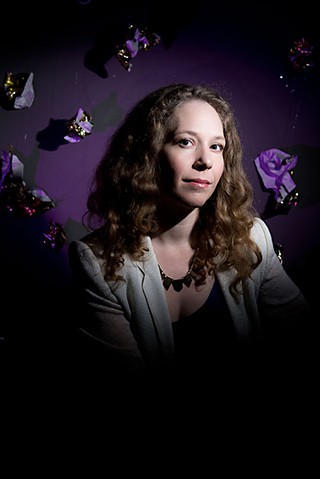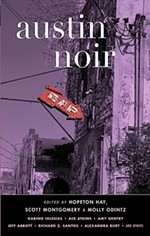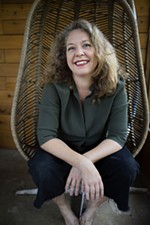Amy Gentry on Good as Gone
This Austin author didn't set out to make her first novel a thriller, but now that it's out, she's good with that
By Jessi Cape, Fri., July 22, 2016
While En Vogue's anti-prejudice hit harmonies from "Free Your Mind" piped through the patio speakers, I sat with former Chronicle columnist Amy Gentry to discuss her debut novel, Good as Gone. The Houston native and longtime Austin resident was excited about her first time on the other side of the interview recorder, and I couldn't help but smile at the pop-magical music selection. The quartet's hit song speaks to gender biases and the complex concept of female agency – two topics that Gentry's new thriller explores in depth.
This story idea germinated more than a decade ago, but it wasn't until she had completed her doctorate and finally committed to full-time dedicated novel work that Gentry was able to create the plot frame that would land her a two-part deal with a major publishing house. From her fascination with kidnap victim Elizabeth Smart to her volunteer work as a victim advocate while writing a weekly style column for the Chronicle ("The Good Eye") to her gradual acceptance of the genre label she didn't expect, Gentry's story grew as she and her writing matured. After a brutal grad school program, she wanted to move back to her "happy place" and credits Austin with helping this novel emerge.
Amy Gentry: Writing for the Chronicle was kind of a dream of mine from undergrad. I looked up to the writers [like Sarah Hepola] so much, and it helped me transition from Ph.D. [work]. I was freelancing, and in the back of my mind, around that time, I started writing my novel. My friend Linden reached out – she'd read my Chronicle writing – and invited me to her writing group. We're kind of like a support group. When I started, I didn't know what I wanted to do. Or write. YA? Dystopian? The idea for this novel was a really old idea, from like 2003.
Austin Chronicle: You'd just been mulling it over?
AG: Well, I hadn't really thought of it in years, but it dates back to the Elizabeth Smart kidnapping. I don't think I would've normally paid that much attention, but at the time I was dating a Mormon guy – that was an adventure in itself – so Mormonism was in 10-foot-tall letters and jumped out at me. The Elizabeth Smart case was disturbing because he just walked into her room, in her house, and took her right out of her house – at knifepoint – while her sister watched. She had this angelic face, just 14, and looked very stereotypically Mormon, but beautiful and pale blond and rosy-faced. She was kind of media-ready in a way. There were a lot of really bizarre aspects of her case, including the fact that she was kidnapped by a religious zealot and kept as basically a sex slave.
AC: Wow, I'm going to have to go back and read about her.
AG: I admire her, actually. As an adult, she really threw herself into advocacy for kidnapped children and victims of sexual abuse. She talked about how much shame she had. She talked about how her religion was stabilizing in some ways, but it was also hard because she felt the religion made it harder for girls and women to acknowledge that they had been abused and accept that it wasn't their fault. I love her adult work, but I tried not to read too much about her – I didn't read her book – because I didn't want to influence myself too much and didn't want the book to be about her. She has a really specific and interesting story. She's said in lots of interviews that she never really lost sight of who she was and she was never really brainwashed and she never bought his lines. She never believed him when he told her this was a holy thing. She was like, "No, I'm just surviving this."
So, for my book, I thought: What if you weren't someone with a super-stable identity and really did get broken by that? What if you didn't have that core strength, for whatever reason? What if you had a different kind of strength and found a different way of surviving? What would that look like?
AC: It is very much about identity .... Also, I hate when people say "strong female character" or "flawed female character" –
AG: As if they're different –
AC: Exactly. But I like how you presented it: [Your character Julie's] psyche is fractured, but it's not done in a way that's gratuitous.
AG: That's good to hear, because one of the things I worried about was whether this was exploitative, especially the abuse of a child. I had to grapple with it: How am I going to write this while being true to how difficult and complicated this experience is?
I had the character pretty well down, but there were some details from the ER ... a lot of that experience [doing sexual assault hospital accompaniments for a year as a volunteer at SafePlace] came in, but a lot was just me trying to imagine my way into this experience and give the many faces of Julie as much room for agency as I could without making her – I don't know how to say this, but I think we have a really hard time in our culture reconciling victimhood and agency. It's as if she'd had agency, then she could've done something differently. But then if she doesn't have agency, she's just a passive victim, which is dehumanizing. So I don't know if I succeeded, but that was a starting point for a lot of what I imagined: What does agency look like in these conditions? She's a survivor and not just in the euphemistic way we use it. Her way of dealing with this was a way that led to a lot of what could be perceived as bad behavior. She doesn't behave well.
AC: That goes back to the strong or flawed female. They're not mutually exclusive. You can be a survivor but do things that aren't ideal to others. It's called being a human.
AG: I agree. And victims of trauma are just as likely to traumatize someone else. When a human being is in duress, you form these coping mechanisms that can be destructive to yourself and others after they've outlived their usefulness. So yeah, society likes its female victims perfect: beautiful and innocent and victimized and without agency. We like them to be passive. Because if they have agency, it compromises victimhood – makes it more likely it's their fault and you can find more reasons that this happened.
AC: So you had this idea early on. Did you stick to the original plan?
AG: I first had the idea when I was a child of 24, and I thought it was going to be ... well, I didn't understand it was a thriller. I thought it was like a Henry James novel.
AC: Well, that's pretty awesome.
AG: No, it's ridiculous. I knew I was ready to start writing it when I suddenly had the idea for the structure – for putting Julie's narration in, having her voice in the novel, but also having her chapters go backward.
AC: But you still didn't necessarily think crime thriller?
AG: Right. I don't like procedurals, I don't like police stuff. I never like mysteries with detectives. I kind of hate detectives.
AC: So, you didn't read [Sue Grafton's] alphabet series?
AG: No, no, no, no. But I'm trying to go back and read more crime fiction now with a new eye because I feel like I've learned a lot about [thrillers] just by writing one and I want to know more. Women have always been really well represented by that genre.
AC: So, there's that marketing angle, linking this book to Gone Girl and The Girl on the Train.
AG: My goal is to write whatever the hell I want. But I've written this thing, and it's a thriller, so accepting that label was important for me. The audience for crime fiction and thrillers is so loyal and so smart and so awesome – there are lots of smart women out there, and men, putting these things away, and there's a reason for that. It's a genre that speaks to high-stakes issues in our lives and is like a set of thought experiments to work through. They give us ways of thinking about the scariest things in our lives. And that's really important to me. So if you have to change the name of the book so that it sounds like Gone Girl to get it to those readers, then I'm okay with that.
AC: Agreed. And the comparison has to be flattering, right?
AG: I gave a talk about this about a year ago, about literature in a post-Gone Girl era. I actually think Gone Girl had an amazing effect on the literary landscape. It was so successful that it opened the door for a lot of women-written thrillers with female protagonists that were not necessarily straightforward tales of the scary world. These novels grappled with questions of agency and victimhood – agency in particular – in interesting ways. I don't know if it's in the air or what, but I think Gillian Flynn's book cracked open something culturally. That book is like a Magic Eye for thinking about rape culture, and it reflects back all of these crazy [things] – it shows rape culture in a funhouse mirror. When I went back and read it again before I gave that talk, I was really impressed by it. So, if I'm going to be linked and compared to anything, I'm honored to be compared to that book.
Amy Gentry will read from and sign copies of Good as Gone Thu., July 28, 7pm, at BookPeople, 603 N. Lamar. For more information, visit www.bookpeople.com.











